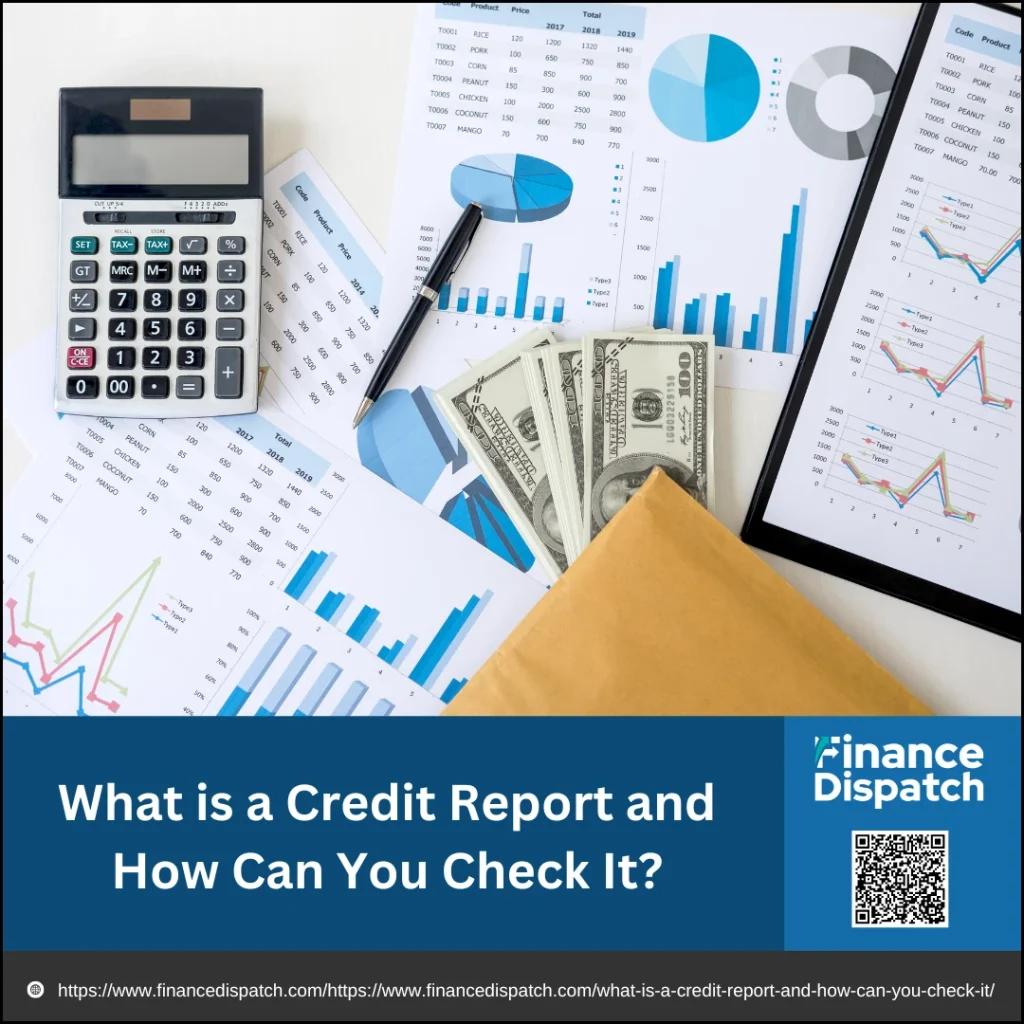Your credit report is more than just a collection of numbers and names—it’s a reflection of your financial behavior and trustworthiness. Whether you’re applying for a loan, renting an apartment, or even interviewing for a job, your credit report can influence the outcome. It summarizes how you’ve handled credit in the past, showing lenders and other institutions whether you’re reliable with money. In this article, we’ll break down exactly what a credit report is, what information it contains, and why it’s so important. Most importantly, you’ll learn how to access your credit report, check it for accuracy, and take steps to protect your financial future.
What is a Credit Report?
A credit report is a detailed record of your credit history, compiled by credit bureaus based on information reported by lenders, creditors, and other financial institutions. It includes personal information, such as your name, address, and Social Security number, along with your credit accounts, payment history, outstanding balances, and any public records like bankruptcies or liens. Think of it as a financial report card that shows how responsibly you’ve managed money over time. Lenders, insurers, landlords, and even some employers use this report to assess your creditworthiness and decide whether to do business with you.
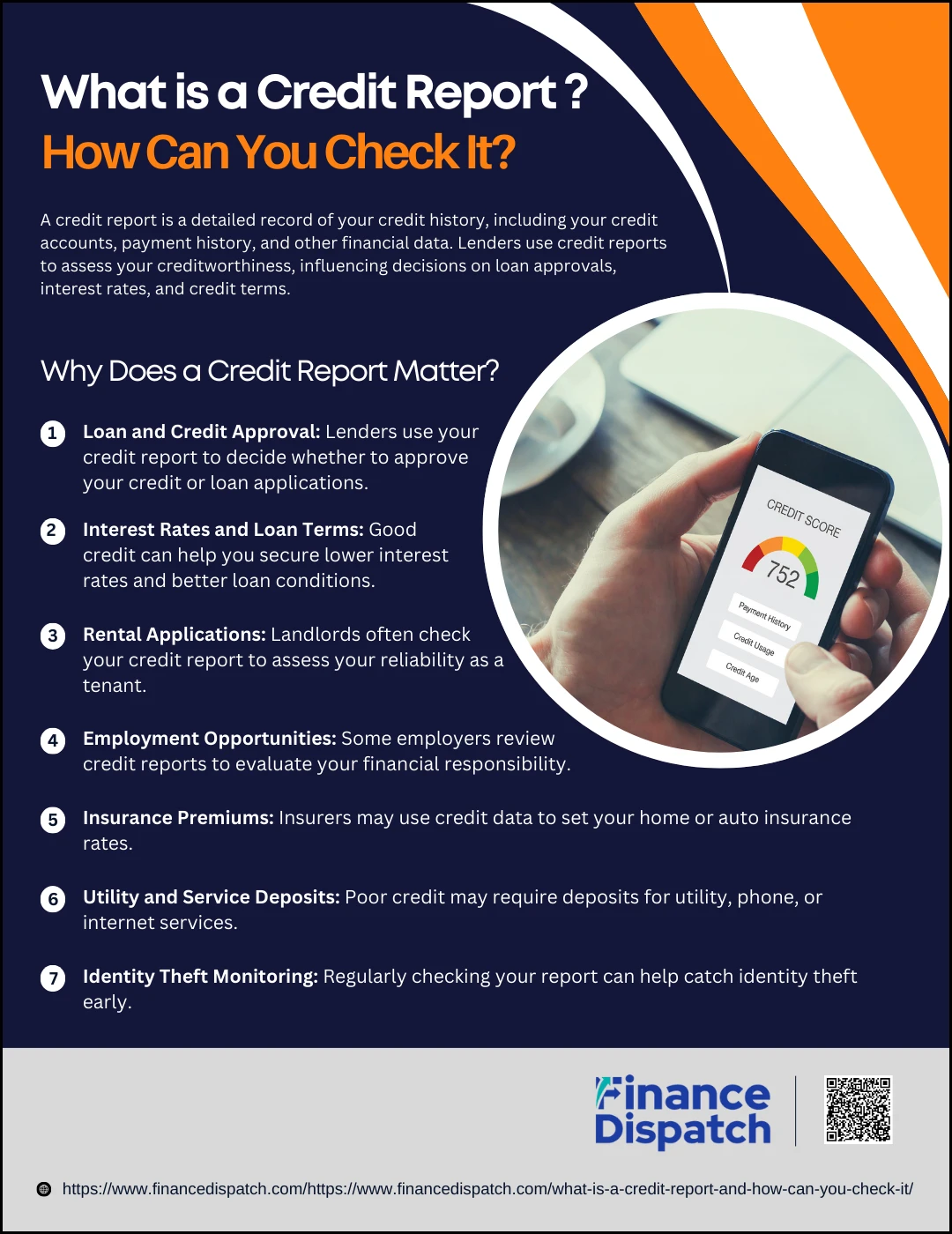 Why Does a Credit Report Matter?
Why Does a Credit Report Matter?
Your credit report is a powerful financial document that speaks volumes about your money management habits. Whether you’re applying for a mortgage, renting an apartment, or even interviewing for a job, the information in your credit report can impact the outcome. It reflects how well you’ve handled credit in the past—whether you pay your bills on time, how much debt you carry, and how often you apply for new credit. Because of its broad reach and importance, maintaining a healthy and accurate credit report is essential to achieving your financial goals and protecting your identity.
Here are several key reasons why your credit report matters:
1. Loan and Credit Approval
When you apply for a credit card, car loan, or mortgage, lenders review your credit report to evaluate your risk as a borrower. A strong report makes approval more likely.
2. Interest Rates and Loan Terms
Good credit can qualify you for lower interest rates and better loan terms. That means you’ll pay less over time, especially on long-term loans like mortgages or auto financing.
3. Rental Applications
Many landlords use credit reports to screen tenants. A clean credit history suggests you’re responsible with money and likely to pay rent on time.
4. Employment Opportunities
Some employers—especially in finance, law enforcement, or government—may check your credit report as part of their background checks to gauge financial responsibility.
5. Insurance Premiums
Auto and home insurance providers often use information from credit reports to help determine your premiums. Better credit can mean lower insurance costs.
6. Utility and Service Deposits
Phone companies, utility providers, and internet services may review your credit report. A weak credit profile could mean having to pay a deposit before service is activated.
7. Identity Theft Monitoring
Reviewing your credit report helps you catch signs of identity theft early—such as unfamiliar accounts or incorrect personal information—allowing you to take action quickly to prevent further damage.
What’s included in a Credit Report?
A credit report is a comprehensive record of your credit activity and history, gathered from various financial institutions and public records. It provides lenders, landlords, insurers, and other entities with a snapshot of your financial reliability. Knowing what’s included in your credit report is essential for understanding how others view your creditworthiness—and for spotting any potential errors or signs of identity theft.
Here are the main components typically included in a credit report:
1. Personal Information
This section contains identifying details like your full name, current and previous addresses, Social Security number (partially masked), date of birth, and employment history. It helps credit bureaus verify your identity and distinguish you from others with similar names.
2. Credit Accounts
This includes all your open and closed credit accounts—credit cards, mortgages, student loans, auto loans, and other lines of credit. It shows when each account was opened, your credit limit or loan amount, balances, payment history, and account status (e.g., open, closed, delinquent).
3. Payment History
Your record of on-time or late payments is one of the most critical aspects of your credit report. It indicates whether you have consistently met your payment obligations and can heavily influence your credit score.
4. Public Records
Legal and financial judgments like bankruptcies, foreclosures, tax liens, and civil suits may appear here. These entries can have a serious negative effect on your credit standing.
5. Credit Inquiries
Any time a lender or institution checks your credit report, an inquiry is recorded. There are two types:
- Hard inquiries, which occur when you apply for credit and may affect your score.
- Soft inquiries, such as when you check your own credit or when a lender pre-approves you for a credit offer—these don’t impact your score.
6. Collections Accounts
If you’ve failed to pay a bill and it was sent to a collection agency, it may appear in this section. Collections can damage your credit and stay on your report for up to seven years.
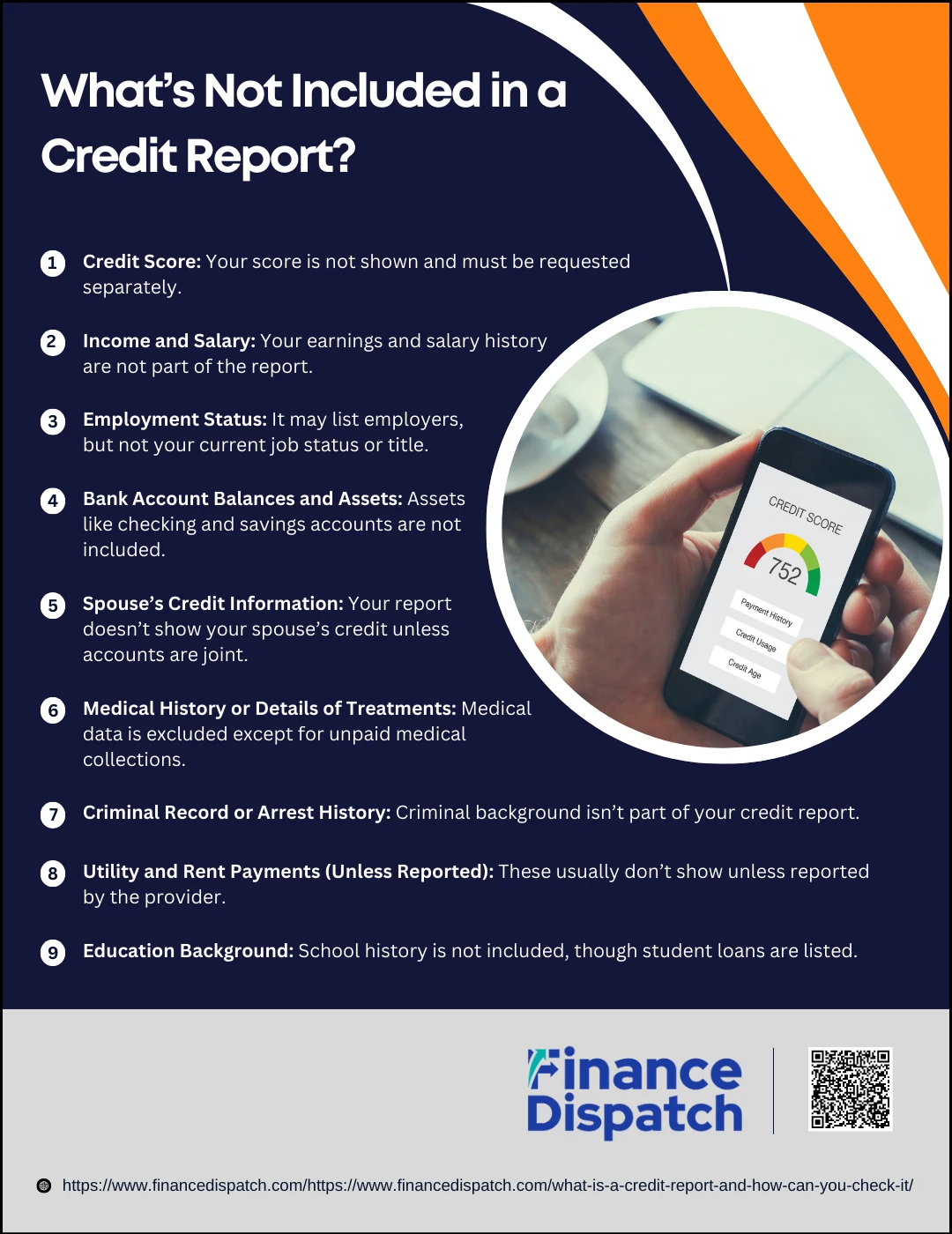 What’s Not Included in a Credit Report?
What’s Not Included in a Credit Report?
A credit report offers a snapshot of your credit activity, but it doesn’t reveal everything about your financial or personal life. Many people assume that a credit report contains all kinds of sensitive or private data, but that’s not the case. Credit bureaus focus specifically on how you use credit, not on your broader lifestyle, job status, or income. Understanding what’s excluded is just as important as knowing what’s included—especially if you’re trying to improve your credit standing or prepare for a major financial decision.
Here are key items that do not appear on your credit report:
1. Credit Score
Your credit report contains the data used to calculate your credit score, but it doesn’t show the score itself. You have to request your credit score separately from a bureau or third-party service.
2. Income and Salary
Your income, salary history, or wage amount is not listed in your credit report. Lenders may ask for your income during the application process, but it doesn’t come from the report itself.
3. Employment Status
Although your report might mention current or former employers for identification purposes, it doesn’t show whether you’re employed, unemployed, or your job position or title.
4. Bank Account Balances and Assets
Your checking accounts, savings accounts, 401(k)s, and investment portfolios are not part of your credit report. These types of assets are not tracked by credit bureaus.
5. Spouse’s Credit Information
Even if you’re married, your credit report is individual. Your spouse’s credit activity, accounts, or debts won’t appear on your report unless you jointly hold those accounts.
6. Medical History or Details of Treatments
Health information, such as diagnoses or treatments, is strictly protected by privacy laws and doesn’t appear on your credit report. Only unpaid medical bills that have been turned over to collections may show up.
7. Criminal Record or Arrest History
Your criminal background is not listed in your credit report. Background checks for jobs or housing may include that information, but it’s separate from what credit bureaus provide.
8. Utility and Rent Payments (Unless Reported)
Regular payments for utilities, rent, and phone bills don’t usually appear unless the service provider reports them or you enroll in a rent-reporting service. However, if you miss payments and they go to collections, they can show up on your report.
9. Education Background
Your educational history, including where you went to school or what degrees you earned, is not part of your credit report. However, student loans as financial accounts will be included.
Credit Report vs. Credit Score
Although people often use the terms “credit report” and “credit score” interchangeably, they are not the same thing. Both play important roles in your financial life, but they serve different purposes. A credit report is a detailed record of your credit history, while a credit score is a three-digit number derived from the information in that report. Understanding the difference between the two can help you better manage your credit and make informed financial decisions.
Here’s a clear comparison between a credit report and a credit score:
| Feature | Credit Report | Credit Score |
| Definition | A detailed record of your credit history and activity | A three-digit number representing your creditworthiness |
| Created By | Credit bureaus (Experian, Equifax, TransUnion) | Scoring models like FICO and VantageScore |
| Includes | Personal info, accounts, payment history, public records, inquiries | Calculated using credit report data (not included in the report) |
| Format | Multi-page document with detailed entries | Single number, usually between 300 and 850 |
| Purpose | To provide a comprehensive view of your credit behavior | To give lenders a quick summary of your credit risk |
| How to Access | Free once per year from each bureau at AnnualCreditReport.com | Often available for free via banks, apps, or for a fee from FICO |
| Impact on Decisions | Used by lenders, landlords, employers, and insurers to evaluate creditworthiness | Used mainly by lenders to make fast decisions on lending terms |
| Update Frequency | Continuously updated as lenders report new data | Updates when the underlying credit report changes |
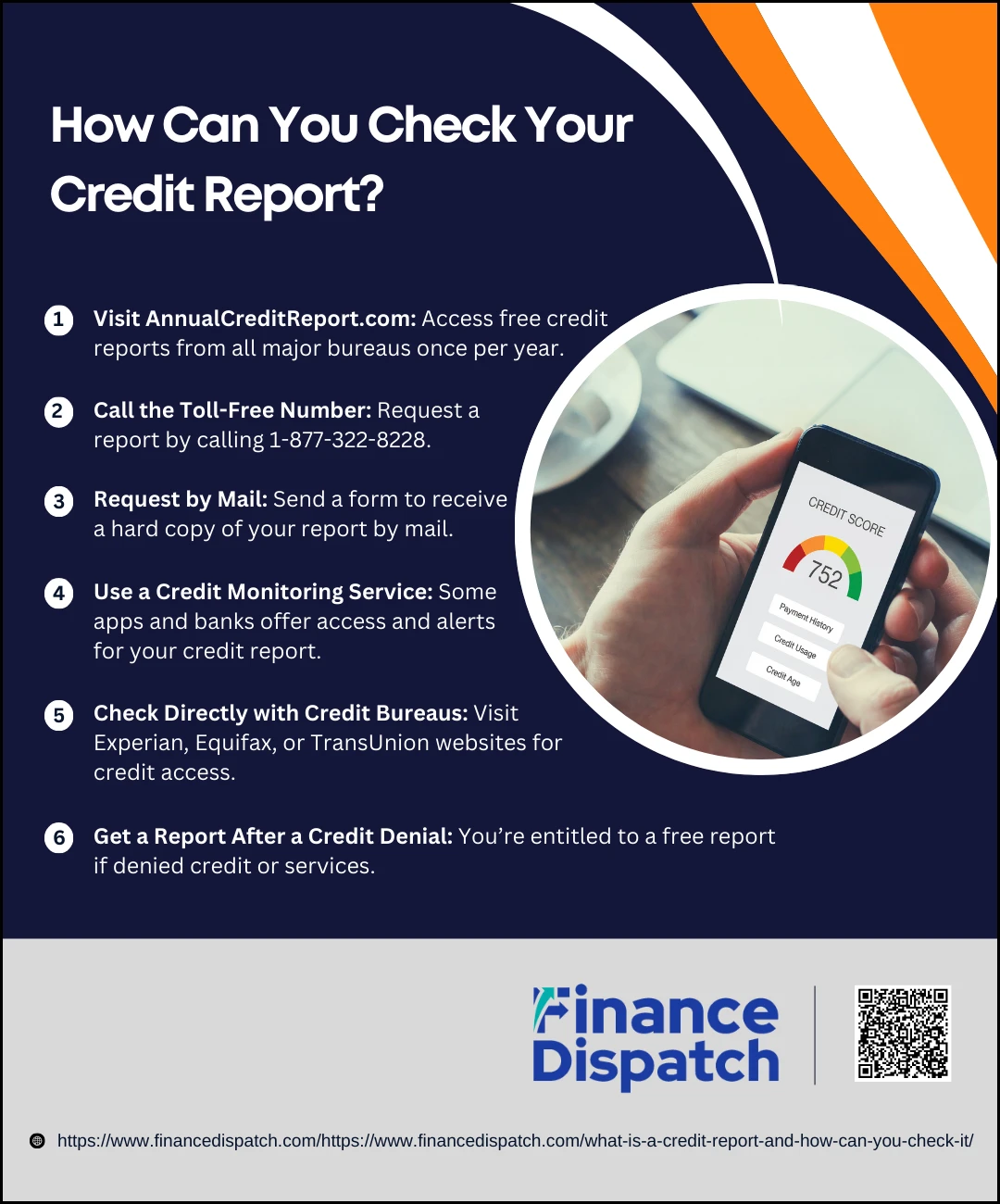 How Can You Check Your Credit Report?
How Can You Check Your Credit Report?
Checking your credit report is a smart and necessary step in maintaining your financial health. It allows you to review the information that lenders and other institutions see when they evaluate your creditworthiness. By reviewing your report regularly, you can catch errors, monitor for identity theft, and better understand what’s impacting your credit score. The good news is—you can access your credit report for free.
Here’s how you can check your credit report:
1. Visit AnnualCreditReport.com
This is the only official website authorized by federal law to provide free credit reports from all three major credit bureaus—Experian, Equifax, and TransUnion. You can request one free report from each bureau every 12 months (or weekly during special periods).
2. Call the Toll-Free Number
You can request your credit report by phone by calling 1-877-322-8228. This is a secure way to get your report if you prefer not to go online.
3. Request by Mail
Download and complete the mail request form from AnnualCreditReport.com, then send it to the address provided on the form. This option may take longer but is useful if you want a hard copy of your report.
4. Use a Credit Monitoring Service
Some financial institutions, credit card companies, or apps offer free access to your credit report or parts of it. These services may also provide alerts for changes to your credit.
5. Check Directly with Credit Bureaus
Each credit bureau—Experian, Equifax, and TransUnion—also offers options to view or monitor your credit report. While the report may be free, some services may come with a fee.
6. Get a Report after a Credit Denial
If you were recently denied credit, employment, insurance, or housing based on your credit, you are entitled to a free credit report from the bureau that provided the information, if you request it within 60 days.
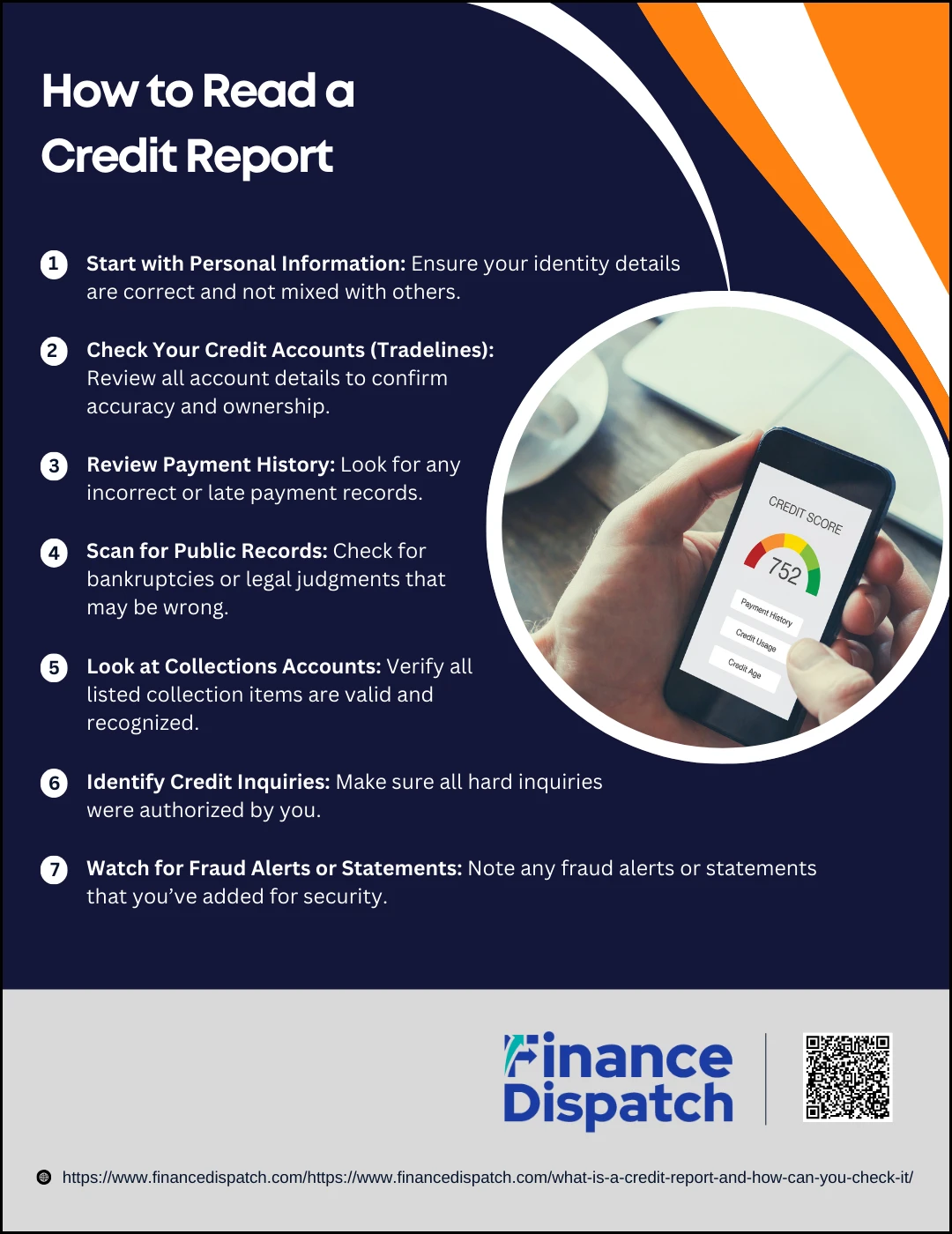 How to Read a Credit Report
How to Read a Credit Report
Reading a credit report for the first time can feel overwhelming, but it’s simpler than it seems once you understand its structure. Your credit report is divided into key sections that provide a snapshot of your credit history and activity. Learning how to review each section carefully can help you spot errors, track your credit behavior, and identify signs of identity theft. Here’s a step-by-step guide to reading your credit report effectively:
1. Start with Personal Information
Review your full name, current and past addresses, Social Security number (partially masked), date of birth, and employment history. Make sure all details are accurate, as incorrect information might indicate a mix-up with someone else’s file or identity theft.
2. Check Your Credit Accounts (Tradelines)
This is the heart of your report. It includes revolving accounts (like credit cards) and installment loans (like mortgages and auto loans). Look at:
- Account names and numbers
- Open/close dates
- Payment history
- Balances and credit limits
Make sure everything matches your actual accounts and that there are no unfamiliar accounts.
3. Review Payment History
Your on-time or late payments are recorded here. Payment history makes up the largest part of your credit score. Look for any reported late payments or delinquencies and verify they are accurate.
4. Scan for Public Records
If applicable, this section shows negative legal information such as bankruptcies, tax liens, or civil judgments. These entries can severely hurt your credit, so double-check for accuracy.
5. Look at Collections Accounts
If a debt has been sent to collections, it will show up here. Make sure you recognize these accounts. If a listed collection is incorrect, begin the dispute process immediately.
6. Identify Credit Inquiries
Inquiries show who has checked your credit and when.
- Hard inquiries affect your credit score and result from applying for credit.
- Soft inquiries do not affect your score and include checks by you or promotional offers.
Ensure that all hard inquiries were authorized by you.
7. Watch for Fraud Alerts or Statements
Some reports include sections for fraud alerts, security freezes, or consumer statements. These can help protect your credit but should only be listed if you requested them.
How Long Does Information Stay on a Credit Report?
Not all information stays on your credit report forever. Each type of account or record has a specific timeline for how long it remains visible. Positive data, like accounts in good standing, can work in your favor and stay on your report for years. On the other hand, negative information—such as late payments or bankruptcies—can impact your credit score for a long time before it eventually drops off. Knowing how long items stay on your report can help you manage your credit more strategically and avoid long-term damage from past mistakes.
Here’s a breakdown of how long different types of information stay on your credit report:
| Type of Information | How Long It Stays on Your Credit Report |
| On-time payments (positive accounts) | Up to 10 years after the account is closed |
| Late payments | 7 years from the date of the missed payment |
| Accounts in collections | 7 years from the original delinquency date |
| Chapter 7 bankruptcy | 10 years from the filing date |
| Chapter 13 bankruptcy | 7 years from the filing date |
| Hard inquiries | 2 years |
| Soft inquiries | Only visible to you and do not impact score |
| Foreclosures | 7 years |
| Paid tax liens (older reports) | 7 years (Note: new tax liens are no longer reported) |
| Unpaid child support | Up to 7 years or longer depending on state reporting laws |
What to Do If You Spot an Error
Finding an error on your credit report can be frustrating, but it’s important to take action quickly. Even a small mistake—like an incorrect payment status or an account you don’t recognize—can negatively affect your credit score or signal identity theft. The good news is that you have the right to dispute inaccuracies, and credit bureaus are required by law to investigate your claims.
Here are the steps you should take if you spot an error on your credit report:
- Review the error carefully
Note exactly what information is incorrect and which bureau’s report contains the error (Experian, Equifax, or TransUnion). - Gather supporting documents
Collect evidence such as account statements, payment confirmations, or correspondence with the creditor to back up your claim. - Contact the credit bureau
Submit a dispute online, by phone, or by mail to the credit bureau that shows the error. Include a clear explanation and your supporting documents. - Notify the creditor or data furnisher
Inform the company that reported the incorrect information. They may be able to correct the mistake directly with the bureau. - Monitor the status of your dispute
Credit bureaus typically investigate within 30 days (or 45 if the dispute follows a free report request). They must notify you of the outcome. - Check all three reports
An error on one bureau’s report may not appear on the others—but it’s still worth reviewing all three to be sure. - Request corrections in writing
After a successful dispute, ask for written confirmation that the error has been removed or corrected. - Keep copies of everything
Save all correspondence and documents related to your dispute for future reference or if the issue resurfaces.
How to Protect and Improve Your Credit Report
Maintaining a strong credit report isn’t just about fixing problems—it’s about building smart habits that protect your credit over time. Whether you’re trying to boost your score, recover from past mistakes, or guard against fraud, consistent attention to your credit report can make a big difference. Small, steady actions can lead to long-term financial stability and better borrowing opportunities.
Here are practical ways to protect and improve your credit report:
- Pay your bills on time
Payment history is the most significant factor in your credit score. Set reminders or use automatic payments to avoid missed due dates. - Keep credit card balances low
High credit utilization can hurt your score. Aim to use less than 30% of your available credit limit on each card. - Limit new credit applications
Opening several new accounts in a short period can lead to multiple hard inquiries and lower your score temporarily. - Review your credit report regularly
Check all three credit reports (Experian, Equifax, TransUnion) at least once a year to catch errors or signs of identity theft early. - Dispute inaccuracies promptly
If you spot incorrect or fraudulent information, file a dispute with the credit bureau and the creditor right away. - Keep older accounts open
The length of your credit history matters. Unless there’s a good reason, consider keeping old accounts open to help your score. - Use a mix of credit types
Having both revolving credit (like credit cards) and installment loans (like car loans) shows lenders you can handle different types of debt. - Enroll in credit monitoring
Credit monitoring services can alert you to changes in your report, helping you respond quickly to suspicious activity. - Add positive payment history
Consider services like Experian Boost to report utility and phone payments, which can help increase your score.
Conclusion
Your credit report is a vital part of your financial identity, shaping how lenders, landlords, insurers, and even employers perceive your reliability. By understanding what a credit report is, what it includes (and doesn’t include), and how to check it, you can take control of your credit health. Regularly reviewing your report helps you catch errors, prevent identity theft, and make smarter financial decisions. With the right habits—like paying bills on time, keeping balances low, and disputing inaccuracies—you can protect and strengthen your credit over time. Remember, a strong credit report isn’t just about numbers—it’s a foundation for reaching your financial goals with confidence.



